Caryn’s Thoughts
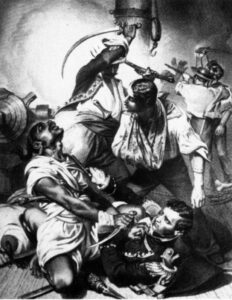
 It is common practice in the military to name destroyers (DD) and destroyer Escorts (DE) after Navy and Marine Corps heroes. The USS Reuben James (DD-245) was a four-funnel (four stack) Clemson-class destroyer made after World War I, and it was the first of three US Navy ships named for Boatswain’s Mate Reuben James (1776–1838), who distinguished himself fighting in the First Barbary War. Apparently, on August 3, 1804, James put himself between his commanding officer, Lieutenant Stephen Decatur and the sword of a Tripolitan sailor, who was trying to defend his commander. When James stepped between the descending sword and his commander, he took the blow to his head. Amazingly, the blow did not kill him, and he recovered later to continue serving in the Navy.
It is common practice in the military to name destroyers (DD) and destroyer Escorts (DE) after Navy and Marine Corps heroes. The USS Reuben James (DD-245) was a four-funnel (four stack) Clemson-class destroyer made after World War I, and it was the first of three US Navy ships named for Boatswain’s Mate Reuben James (1776–1838), who distinguished himself fighting in the First Barbary War. Apparently, on August 3, 1804, James put himself between his commanding officer, Lieutenant Stephen Decatur and the sword of a Tripolitan sailor, who was trying to defend his commander. When James stepped between the descending sword and his commander, he took the blow to his head. Amazingly, the blow did not kill him, and he recovered later to continue serving in the Navy.
The Destroyer named after Boatswain’s Mate Reuben James, was the first sunk by hostile action in the European Theater of World War II. The USS Reuben James was laid down on April 2, 1919, by the New York Shipbuilding Corporation of Camden, New Jersey, launched on October 4, 1919, and commissioned on September 24, 1920. the ship was assigned to the Atlantic Fleet. Mainly, it was being used in the Mediterranean Sea during 1921–1922. The ship went from Newport, Rhode Island, on November 30, 1920, to Zelenika, Yugoslavia and arrived on December 18th. It operated in the Adriatic Sea and the Mediterranean out of Zelenika and Gruz (Dubrovnik), Yugoslavia, assisting refugees and participating in post-World War I investigations during the spring and summer of 1921. Then, it joined the protected cruiser Olympia at ceremonies marking the return of the Unknown Soldier to the United States in October 1921 at Le Havre. From October 29, 1921, to February 3, 1922, it assisted the American Relief Administration in its efforts to relieve hunger and misery at Danzig. After completing its tour of duty in the Mediterranean, it departed Gibraltar on July 17th.
Following its tour in the Mediterranean, the ship was based out of New York City, where it routinely patrolled the Nicaraguan coast to prevent the delivery of weapons to revolutionaries in early 1926. During the spring of 1929, it participated in fleet maneuvers that helped develop naval airpower. On January 20, 1931, the Reuben James was
decommissioned at Philadelphia, only to be recommissioned on March 9, 1932. The ship again operated in the Atlantic Ocean and the Caribbean Sea, patrolling Cuban waters during the coup by Fulgencio Batista. Then, in 1934, it was transferred to San Diego. After maneuvers that evaluated aircraft carriers, the Reuben James returned to the Atlantic Fleet in January 1939.
Upon the beginning of World War II in Europe in September 1939, but before the United States joined in the fight, the Reuben James was assigned to the Neutrality Patrol, guarding the Atlantic and Caribbean approaches to the American coast. The ship joined the force established to escort convoys sailing to Great Britain in March 1941. With U-Boat attacks on the rise, this force began escorting convoys as far as Iceland, after which the convoys became the responsibility of British escorts. At that time, it was based at Hvalfjordur, Iceland, commanded by Lieutenant Commander Heywood Lane Edwards.
It would be the escort post that would be the ship in the wrong place at the wrong time. On October 23rd, it sailed from Naval Station Argentia, Newfoundland, with four other destroyers, escorting eastbound Convoy HX 156. All seemed to be going well until, at dawn on October 31st, the Reuben James was torpedoed near Iceland by German U-Boat U-552 commanded by Kapitänleutnant Erich Topp. The Reuben James had positioned itself between an ammunition ship in the convoy and the known position of a German “wolfpack.” The “wolfpack” was a group of submarines poised to attack the convoy. Apparently, the destroyer was not flying the Ensign of the United States, that might have saved it…or maybe not, since it was in the process of dropping depth charges on another U-boat when U-552 engaged. The Reuben James was hit forward by a torpedo meant for a merchant ship and the torpedo blew the entire bow off when a magazine exploded upon the torpedoes impact. The bow of the Reuban James sank immediately. The aft section floated for five minutes before going down. I can only 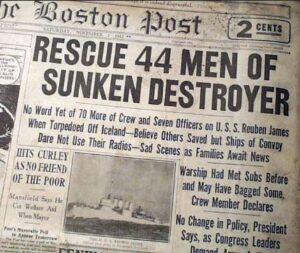
 imagine the shock of those around them when the ship was gone so quickly. USS Reuben James carried a crew of seven officers and 136 enlisted men. They also had one enlisted passenger. Of the total of 144 men on board, 100 were killed, including all the officers. Only 44 enlisted men survived the attack. It was the first US warship sunk in World War II, and strangely, the destroyer was sunk before the United States had officially joined the war.
imagine the shock of those around them when the ship was gone so quickly. USS Reuben James carried a crew of seven officers and 136 enlisted men. They also had one enlisted passenger. Of the total of 144 men on board, 100 were killed, including all the officers. Only 44 enlisted men survived the attack. It was the first US warship sunk in World War II, and strangely, the destroyer was sunk before the United States had officially joined the war.

 My nephew, Matt Miller, is having a great year. Last year, on August 14th, Matt became a member of our family, when he married my niece, Michelle. With everything going on, and their prior wedding date having been postponed due to Covid, they decided to wait to take a honeymoon until this year. They wanted to let all the restrictions end before they took the most important trip of their married lives. So, for their first anniversary, they took their honeymoon trip to Saint Thomas, in the Virgin Islands. They have been honeymooning since they got married, so the trip was just the next step. They had a wonderful time on their trip. They snorkeled a lot and got to do something called SNUBA which is kind of like scuba diving, but you don’t have to train for it. They stayed at an all-inclusive resort, and they just loved it. They didn’t have to go anywhere or do anything they didn’t want to, they just relaxed, had fun, and had adventures.
My nephew, Matt Miller, is having a great year. Last year, on August 14th, Matt became a member of our family, when he married my niece, Michelle. With everything going on, and their prior wedding date having been postponed due to Covid, they decided to wait to take a honeymoon until this year. They wanted to let all the restrictions end before they took the most important trip of their married lives. So, for their first anniversary, they took their honeymoon trip to Saint Thomas, in the Virgin Islands. They have been honeymooning since they got married, so the trip was just the next step. They had a wonderful time on their trip. They snorkeled a lot and got to do something called SNUBA which is kind of like scuba diving, but you don’t have to train for it. They stayed at an all-inclusive resort, and they just loved it. They didn’t have to go anywhere or do anything they didn’t want to, they just relaxed, had fun, and had adventures.
They are both doing amazing at their jobs. Matt is a Production Supervisor at Peabody Energy at the North Antelope Rochelle Mine, and Michelle is an Art Educator at the Nicolaysen Art Museum. Their careers are really  taking off, and they are so excited to be doing the work they love. With their careers going well, they decided to start looking for a house, although with the market as bad as it is, it may not be the perfect time to do so. They aren’t in a huge hurry, so they are just checking to see what’s out there. They have a specific type of property in mind. They are hoping to find something with a couple acres of land because Matt has a lot of toys, so he needs a shop desperately. Men have to have their tinkering place.
taking off, and they are so excited to be doing the work they love. With their careers going well, they decided to start looking for a house, although with the market as bad as it is, it may not be the perfect time to do so. They aren’t in a huge hurry, so they are just checking to see what’s out there. They have a specific type of property in mind. They are hoping to find something with a couple acres of land because Matt has a lot of toys, so he needs a shop desperately. Men have to have their tinkering place.
Matt loves kids, and he is the best uncle to all of his nieces and nephew. He has three nieces, Hannah Miller, Elliott and Maya Stevens, as well as bonus niece and nephew, Brooklyn and Jaxon Killinger. The kids absolutely love their uncle, and he spoils them rotten…or so I’m told. I think he is just practicing for the children he and Michelle plan to have one of these days. They are very excited to have kids soon, and we all can’t wait either!! Babies are the most wonderful gift ever. For now, Matt is the best dog dad! They love and spoil their dogs, Obi and Leia…maybe, they say, a little more than some people would call normal, but I think they are like most pet 
 parents. Those dogs are their babies and will be even when the kids arrive. They are part of the family too.
parents. Those dogs are their babies and will be even when the kids arrive. They are part of the family too.
Matt did get a new “baby” this year…his new truck, and he is quite obsessed with it. this year that he is obsessed with it. Boys and their toys!! From trucks, to snowmobiles, to 4 wheelers, to motorcycles. It doesn’t matter what their toy of choice is. Boys will always be obsessed with their toys. Today is Matt’s birthday. Happy birthday Matt!! Have a great day!! We love you!!

 A number of years ago, I had the opportunity to go on a couple of business trips with my boss, Jim Stengel, in his plane. At that time, he introduced me to aviation charts, and I found them very interesting. You could see every airport on them, even the small private airports. You could also see every river, lake, and even pond, and they actually looked right on the map. I suppose the shapes would be off these days, due to droughts and such, but with GPS, I suppose they aren’t as necessary. Aviation charts could almost be considered a novelty now.
A number of years ago, I had the opportunity to go on a couple of business trips with my boss, Jim Stengel, in his plane. At that time, he introduced me to aviation charts, and I found them very interesting. You could see every airport on them, even the small private airports. You could also see every river, lake, and even pond, and they actually looked right on the map. I suppose the shapes would be off these days, due to droughts and such, but with GPS, I suppose they aren’t as necessary. Aviation charts could almost be considered a novelty now.
These days airmail is common, but on August 20, 1920, when the United States opened its first coast-to-coast airmail delivery route, we were just 60 years past the time when the Pony Express closed up shop. To me that is astounding…from horses to airplanes in just 60 years. When airmail got started, they didn’t have any of those aviation charts that had fascinated me on those flights with Jim. In those days, pilots had to navigate by sight…yikes!! Just imagine flying in bad weather, not to mention night flying, which was just about impossible. Some brainstorming was needed.
The Postal Service came up with a unique navigational system. The world’s first ground-based civilian navigation system was made up of a series of lighted beacons that extended from New York to San Francisco. I would think the pilots would have to be quite experienced to follow this plan. The plan included a series of 70-foot concrete arrows, placed ten miles apart from coast to coast. The arrows were painted bright yellow, and at the center of each arrow, stood a 51-foot steel tower. On top of the tower was a million-candlepower rotating beacon. Below the rotating light were two course lights pointing forward and backward along the arrow. The course lights flashed a code to identify the beacon’s number. A generator shed at the tail, or feather end of each arrow powered the beacon and lights, if that became necessary.
Like the railroad, the Airmail system was built in stages. By 1924, just a year after Congress funded it, the line of giant concrete markers stretched from Rock Springs, Wyoming to Cleveland, Ohio. The next summer, it reached all the way to New York and then, by 1929, it extended all the way to San Francisco. It worked so well, that in 1926, the new Aeronautics Branch in the Department of Commerce, now known as United States Postal Service, proposed a 650-mile air mail route linking Los Angeles to Salt Lake City. That route was designated as Contract Air Mail Route 4 (CAM-4). The system seemed well on its way to modernizing mail delivery forever, but
 before long, the advances in communication and navigation technology made the big arrows obsolete, as new technology will. By the 1940s, the Commerce Department decommissioned the beacons. To help the war effort, the steel towers were torn down and sent to be used elsewhere. Today, many of the arrows have been removed, but there are still a few that remain. I suppose if you spent some time scanning Google Earth, or flying along the old routes, you might be able to see a few of these old pieces of history.
before long, the advances in communication and navigation technology made the big arrows obsolete, as new technology will. By the 1940s, the Commerce Department decommissioned the beacons. To help the war effort, the steel towers were torn down and sent to be used elsewhere. Today, many of the arrows have been removed, but there are still a few that remain. I suppose if you spent some time scanning Google Earth, or flying along the old routes, you might be able to see a few of these old pieces of history.

 When Chris Kirk married my grandniece, Siara, he became my grandnephew. One of the things that Chris and Siara have in common is a love of exercise. They both work very hard at their fitness goals, and they love to work out together. I am amazed at how strong they both are. In fact, when they began dating, some of the first pictures we saw of the two of them working out together. I was amazed at the abilities of both of them. Chris works hard at the gym too, and he is always trying for personal bests and trying to be in power lifting contests.
When Chris Kirk married my grandniece, Siara, he became my grandnephew. One of the things that Chris and Siara have in common is a love of exercise. They both work very hard at their fitness goals, and they love to work out together. I am amazed at how strong they both are. In fact, when they began dating, some of the first pictures we saw of the two of them working out together. I was amazed at the abilities of both of them. Chris works hard at the gym too, and he is always trying for personal bests and trying to be in power lifting contests.
Chris is a hardworking man, who has moved up faster than anyone else who was hired at WL Plastics when he was. It is Chris’ goal to become a line operator, and he is moving quickly 
 toward that goal. His work ethic is great, and as we all know, lots of people these days want a paycheck, but don’t really want to work. That idea couldn’t be further from Chris’ mind. When he takes on a job, Chris gives it his all. He is loyal to the people he works for, and they appreciate that. I’m sure that is why he is moving up so quickly. He will make a great line operator very soon.
toward that goal. His work ethic is great, and as we all know, lots of people these days want a paycheck, but don’t really want to work. That idea couldn’t be further from Chris’ mind. When he takes on a job, Chris gives it his all. He is loyal to the people he works for, and they appreciate that. I’m sure that is why he is moving up so quickly. He will make a great line operator very soon.
When Siara lost her son, Alec Olsen, she was devastated, and after her first marriage broke up, she wasn’t sure she would ever get to be a mom again. Then Chris came along, and while they are not pregnant yet, Chris has wanted a family since he was 12 years old, so their goal to have a family is a common one for 
 them. In an unusual twist, Chris and Alec share a birthday. That is something that Siara finds very sweet. Her two loves, her husband and her son share a common bond even though they have never met…yet anyway. They will in Heaven, and I think they will love each other very much. Since today is both of Siara’s boys’ birthdays, they have decided to spend the weekend in Denver as a little celebration of the lives of both of them. I can’t wait for Chris and Siara to start a family. Chris is such a loving man, and he has been such a great blessing to Siara. I know he will be a great dad, when that day comes…just as he has been a great husband to Siara. Today is Chris’ birthday. Happy birthday Chris!! Have a great day!! We love you!!
them. In an unusual twist, Chris and Alec share a birthday. That is something that Siara finds very sweet. Her two loves, her husband and her son share a common bond even though they have never met…yet anyway. They will in Heaven, and I think they will love each other very much. Since today is both of Siara’s boys’ birthdays, they have decided to spend the weekend in Denver as a little celebration of the lives of both of them. I can’t wait for Chris and Siara to start a family. Chris is such a loving man, and he has been such a great blessing to Siara. I know he will be a great dad, when that day comes…just as he has been a great husband to Siara. Today is Chris’ birthday. Happy birthday Chris!! Have a great day!! We love you!!

 My niece, Susan Griffith has been having an interesting year. She has one daughter, Jala Satterwhite, who has moved out and is living on her own now. Jala also took her first cross country flight alone. Susan was a bit of a basket case over that one…which she may or may not have wanted Jala to know, so don’t read that part, Jala. Susan has been teaching her other daughter, Kaytlyn Griffith to drive, so she could get her hardship license, which she recently received. Susan and her husband, Josh Griffith purchased a placed in the country, and with Jala no longer in the home, Kaytlyn qualifies for the hardship license. It’s a little easier to take these new steps in the lives of your kids, when they are closer to home, so at least for now, Susan is ok with Kaytlyn’s new-found freedom.
My niece, Susan Griffith has been having an interesting year. She has one daughter, Jala Satterwhite, who has moved out and is living on her own now. Jala also took her first cross country flight alone. Susan was a bit of a basket case over that one…which she may or may not have wanted Jala to know, so don’t read that part, Jala. Susan has been teaching her other daughter, Kaytlyn Griffith to drive, so she could get her hardship license, which she recently received. Susan and her husband, Josh Griffith purchased a placed in the country, and with Jala no longer in the home, Kaytlyn qualifies for the hardship license. It’s a little easier to take these new steps in the lives of your kids, when they are closer to home, so at least for now, Susan is ok with Kaytlyn’s new-found freedom. 
Susan has always been such an optimistic person, and she always tells Jala that every year, life just gets better and better. That is a wonderful attitude to have. It pretty much guarantees happiness. Susan says that she is the happiest she has ever been with her life, and that the 40s have been the best ever. While that is very true, the 40s can also bring about change…like empty nest syndrome. While Susan isn’t there yet, she only has one of her children still at home. She does miss her older daughter though, and nothing proves that more than the “renaming” of the dog. Susan used to call Jala, “Jala Elizabeth” and now the dog is “Olive Elizabeth” as opposed to just Olive. I think she misses her girl some. Nevertheless, Jala isn’t too far away. She just moved to town. Still, you don’t see as much of your kids when they move out, so it’s a little hard.
Life is all about change. It’s just something each of us has to deal with. Much of that change is wonderful, some is sad, and some of it is just new. Susan has a great perspective concerning change. With that, she will do well 
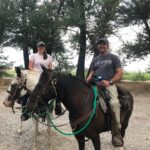 in life. Susan will always have her beautiful place in the country, camping with her husband, and her great outlook on life, and those things will take her wherever she wants to go. She and Josh like to travel, and they have taken the family to some great places, and I’m sure there will be more in the future, and later, some trips for just the two of them…like maybe a second honeymoon. Today is Susan’s birthday. Happy birthday Susan!! Have a great day!! We love you!!
in life. Susan will always have her beautiful place in the country, camping with her husband, and her great outlook on life, and those things will take her wherever she wants to go. She and Josh like to travel, and they have taken the family to some great places, and I’m sure there will be more in the future, and later, some trips for just the two of them…like maybe a second honeymoon. Today is Susan’s birthday. Happy birthday Susan!! Have a great day!! We love you!!

 My nephew, Rob Masterson, says of his wife, Dustie, “This is our 22nd year together. We will celebrate our 20th wedding anniversary in January, but we have been together 22 years. She remains the love of my life. She is a remarkable woman at home and at work. Her boss has put her on the fast track as far as her advancement in the company. She loves her children…even when she wants to strangle them. Then again, I suspect that’s true of all mothers. I am prouder now than I was the day I married her, to be allowed to be her husband.” Such a beautiful tribute. It made me cry. Words of love from a husband to a wife. Some things simply cannot be improved upon by summarizing them.
My nephew, Rob Masterson, says of his wife, Dustie, “This is our 22nd year together. We will celebrate our 20th wedding anniversary in January, but we have been together 22 years. She remains the love of my life. She is a remarkable woman at home and at work. Her boss has put her on the fast track as far as her advancement in the company. She loves her children…even when she wants to strangle them. Then again, I suspect that’s true of all mothers. I am prouder now than I was the day I married her, to be allowed to be her husband.” Such a beautiful tribute. It made me cry. Words of love from a husband to a wife. Some things simply cannot be improved upon by summarizing them.
Dustie has a way of taking things in stride, even when that isn’t the easiest thing to do. The family had a cat, named Scratch. The cat was so loved, but one day Scratch went missing. It was such a sad day for the whole family, but Scratch was Dustie’s cat, so it was especially sad for her, but Dustie persevered. Sadly, Scratch didn’t come back, and after waiting for a few months, Dustie decided that the time had come to get a new cat.  So, they got a sweet little kitten and named him Moxie. Like Scratch, Moxie is very much a momma’s boy. Moxie loves to cuddle and be loved on, and Dustie coddles him. I think she must have a magnetic personality…especially for kitties.
So, they got a sweet little kitten and named him Moxie. Like Scratch, Moxie is very much a momma’s boy. Moxie loves to cuddle and be loved on, and Dustie coddles him. I think she must have a magnetic personality…especially for kitties.
Dustie has been working at Walgreen’s for a couple of years now, and she was recently promoted to ESM (Emerging Store Manager). That is second in command, and person in charge when the manager is off duty. She has worked very hard to be the best she can be. In order to receive this promotion, Dustie had to know every part of the store operations, including the Pharmacy, so she has taken a pharmacy tech training course. Dustie works very hard, and she has been learning many things pertaining to her job and possible promotions. She has a lot of responsibility now, but she loves it. As, her daughter, Raelynn said, “She’s been taking her life and making it great.” Dustie is also learning German and doing quite well. My only question is, why didn’t she learn it when I was learning it (in high school)? I needed someone to practice with. Her mother-in-law, my sister, Cheryl says she was too young. I say that is no excuse!!! Of course, the reality is that Dustie wasn’t born yet when I was in high school. Still no excuse, Dustie!!
Daughter, Taylor says, “Mom has always listened to our needs and wants. She has always been there for Rae, 
 Matt, and me, especially right now and she is always checking in with Dad on how he’s feeling. Mom just amazing.” Raelynn says, “I really look up to mom. She doesn’t let things hold her down for very long.” No, she doesn’t. Dustie has always been a happy person, and that’s why we have all loved her since she and Rob started dating 22 years ago. Today is Dustie’s birthday. Happy birthday Dustie!! Have a great day!! We love you!!
Matt, and me, especially right now and she is always checking in with Dad on how he’s feeling. Mom just amazing.” Raelynn says, “I really look up to mom. She doesn’t let things hold her down for very long.” No, she doesn’t. Dustie has always been a happy person, and that’s why we have all loved her since she and Rob started dating 22 years ago. Today is Dustie’s birthday. Happy birthday Dustie!! Have a great day!! We love you!!

![]()
 My aunt, Sandy Patton is the youngest of my grandparents, George and Hattie Byer’s children. Life for a youngest child is normally very different than that of the oldest child…especially in a large family. My grandparents had nine children. From almost the time Aunt Sandy was three years old, basically from the time her first memory, there were babies in the household. The older children had similar experiences, but it’s a bit different when the babies are younger siblings…or maybe it isn’t. The nieces and nephews were there a lot, but they did go home too. Nevertheless, as a young girl, she always had playmates…at least when she could play.
My aunt, Sandy Patton is the youngest of my grandparents, George and Hattie Byer’s children. Life for a youngest child is normally very different than that of the oldest child…especially in a large family. My grandparents had nine children. From almost the time Aunt Sandy was three years old, basically from the time her first memory, there were babies in the household. The older children had similar experiences, but it’s a bit different when the babies are younger siblings…or maybe it isn’t. The nieces and nephews were there a lot, but they did go home too. Nevertheless, as a young girl, she always had playmates…at least when she could play.
Aunt Sandy was a sickly child, and often missed school, so in reality, her best friend was her mom. They spent a lot of time together while her mom care for her ailing daughter. When a child is sick, they need bedrest, but when they aren’t sleeping…that can make for long boring days. So, to ease the boredom, Grandma Byer told her daughter stories of the past…Grandma’s past and Aunt Sandy’s heritage. Some of the stories were about 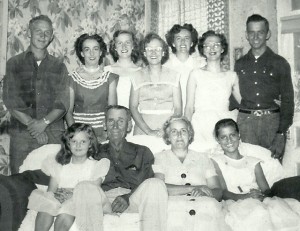
 Grandma’s childhood years, and others were about her ancestors. Aunt Sandy learned about the Cowboys and Indians, the lives of farmers and homesteaders, early automobiles, and about Aunt Sandy’s older siblings’ antics. When she wasn’t sick, Aunt Sandy had to take on the job of catching up on her studies. I don’t imagine that was fun, and I would think that there were many times when Aunt Sandy, thought about quitting school, but she didn’t…and maybe Grandma wouldn’t have let her do that. Whether Aunt Sandy liked school or not really made no difference, because if there was one subject she did like history. She loved hearing about the past, probably because her mom made it so real to her…almost like she was right there.
Grandma’s childhood years, and others were about her ancestors. Aunt Sandy learned about the Cowboys and Indians, the lives of farmers and homesteaders, early automobiles, and about Aunt Sandy’s older siblings’ antics. When she wasn’t sick, Aunt Sandy had to take on the job of catching up on her studies. I don’t imagine that was fun, and I would think that there were many times when Aunt Sandy, thought about quitting school, but she didn’t…and maybe Grandma wouldn’t have let her do that. Whether Aunt Sandy liked school or not really made no difference, because if there was one subject she did like history. She loved hearing about the past, probably because her mom made it so real to her…almost like she was right there.
Aunt Sandy still loves hearing about family today, and really enjoys hearing about all the new additions, and the exciting things everyone is doing. She is the keeper of traditions, which stands to reason, since she is the youngest. It seems like tradition always falls to the youngest child eventually…at least until they pass the baton 
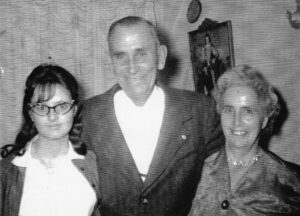 to the next generation. Sometimes it’s hard to pass that baton, because you never know if there will be a child of the next generation who is willing to pick that baton up and run with it. It was the hope of her parents, my grandparents that we always find a way to keep the family as close as possible. Aunt Sandy tried her best, and hopefully now, we will continue to try our best. Today is Aunt Sandy’s 77th birthday. Happy birthday Aunt Sandy!! Have a great day!! We love you!!
to the next generation. Sometimes it’s hard to pass that baton, because you never know if there will be a child of the next generation who is willing to pick that baton up and run with it. It was the hope of her parents, my grandparents that we always find a way to keep the family as close as possible. Aunt Sandy tried her best, and hopefully now, we will continue to try our best. Today is Aunt Sandy’s 77th birthday. Happy birthday Aunt Sandy!! Have a great day!! We love you!!

 It has been a rough couple of years for my nephew, Tucker Schulenberg. On January 19, 2021, he lost his mother, Rachel Schulenberg to a stroke. It was an extremely difficult grieving process for a boy who was barely 13 years old at the time. Suddenly, he felt very alone, even though his dad, my brother-in-law Ron Schulenberg was there. The problem was that they were both grieving, and that makes it doubly hard. Then, when Covid hit, and school wasn’t in session, Tucker really became more of a recluse. It was a tough time.
It has been a rough couple of years for my nephew, Tucker Schulenberg. On January 19, 2021, he lost his mother, Rachel Schulenberg to a stroke. It was an extremely difficult grieving process for a boy who was barely 13 years old at the time. Suddenly, he felt very alone, even though his dad, my brother-in-law Ron Schulenberg was there. The problem was that they were both grieving, and that makes it doubly hard. Then, when Covid hit, and school wasn’t in session, Tucker really became more of a recluse. It was a tough time.
Things are getting better now, after a long hard road. Tucker is in a new school, with smaller classrooms and it seems to be going a little better at now. This school has shown good  success with other students, and now Tuckers grade are better too. I don’t know what Tucker would like to do as an adult, and I’m not sure he does either, but I’m sure that he will find his way. Ultimately, most kids do, and Tucker is a good kid.
success with other students, and now Tuckers grade are better too. I don’t know what Tucker would like to do as an adult, and I’m not sure he does either, but I’m sure that he will find his way. Ultimately, most kids do, and Tucker is a good kid.
Tucker really enjoys the monthly family dinners that our family does. He likes kids and it gives him a chance to play with his cousins, Reagan, Hattie, Bowen, and Maeve. When we go to their house, there is a lot to do. They have lots of farm animals, plenty of dogs, and a trampoline, which is always an attraction. Being around the cousins is a good thing for him. Since he is the only child at home, the only other social time he gets is at school, and as we all know, you shouldn’t really be socializing in class.
Tucker also has a brand-new nephew, which is very cool. Since his brother, Riley Birky and his partner Sierah 
 Martin, live in Powell, Tucker doesn’t get to see a whole lot of them, but I imagine that this summer will give him the opportunity to go for a visit, and since Powell isn’t terribly far away, Tucker gets to visit every once in a while. Tucker is also going to be an uncle again, when his sister, Cassie Franklin and her partner Wesley Burr, have their new baby, coming in January 2023. Tucker is a good uncle, so I’m happy for him. So, for Tucker, there is a lot of new things going on. It is my hope that the new year will bring much healing of Tucker’s broken heart, and much joy as he sees these new babies in his life. Today is Tucker’s 15th birthday. Happy birthday Tucker!! Have a great day!! We love you!!
Martin, live in Powell, Tucker doesn’t get to see a whole lot of them, but I imagine that this summer will give him the opportunity to go for a visit, and since Powell isn’t terribly far away, Tucker gets to visit every once in a while. Tucker is also going to be an uncle again, when his sister, Cassie Franklin and her partner Wesley Burr, have their new baby, coming in January 2023. Tucker is a good uncle, so I’m happy for him. So, for Tucker, there is a lot of new things going on. It is my hope that the new year will bring much healing of Tucker’s broken heart, and much joy as he sees these new babies in his life. Today is Tucker’s 15th birthday. Happy birthday Tucker!! Have a great day!! We love you!!

 Born the day after her mom’s birthday, Reagan Parmely is the oldest child of my nephew and niece, Eric and Ashley Parmely. She was their first blessing, and she is a great blessing to their family, and to our whole family, but Reagan wants to be a blessing to more than just her family. Reagan is taking part in 4-H now and recently sold a sheep. She made a nice profit, and she could have kept all the money for herself, but that just isn’t her style. Reagan is a giver, like her parents. So, after her sale, her first 4-H check has been deposited, and she has decided to make donations to three charities. She picked Central Wyoming Aviary-Rescue and Sanctuary, Wyoming Food for Thought Project, and The Orr’s Hope Foundation. So many people and birds will be helped because of her generosity. It was a very proud moment for her parents, and especially her mom, who might have embarrassed Reagan just a little bit when she cried as Reagan gave the check to Wyoming Food for Thought. Nevertheless, when Reagan gave
Born the day after her mom’s birthday, Reagan Parmely is the oldest child of my nephew and niece, Eric and Ashley Parmely. She was their first blessing, and she is a great blessing to their family, and to our whole family, but Reagan wants to be a blessing to more than just her family. Reagan is taking part in 4-H now and recently sold a sheep. She made a nice profit, and she could have kept all the money for herself, but that just isn’t her style. Reagan is a giver, like her parents. So, after her sale, her first 4-H check has been deposited, and she has decided to make donations to three charities. She picked Central Wyoming Aviary-Rescue and Sanctuary, Wyoming Food for Thought Project, and The Orr’s Hope Foundation. So many people and birds will be helped because of her generosity. It was a very proud moment for her parents, and especially her mom, who might have embarrassed Reagan just a little bit when she cried as Reagan gave the check to Wyoming Food for Thought. Nevertheless, when Reagan gave 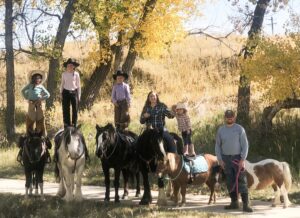 them the donation and they said it would feed a child for almost half a year!! That is no small thing…especially for the child Reagan fed with her gift.
them the donation and they said it would feed a child for almost half a year!! That is no small thing…especially for the child Reagan fed with her gift.
While this story of Reagan’s generosity is on the spectacular side, it isn’t unusual for Reagan. Mature for her years, Reagan is a loving big sister, to her younger siblings, Hattie, Bowen, and Maeve, and a big help to her parents. Over the years, I have watched her grow, and while I’m sure there are some of the normal kid disputes, Reagan has always been a nurturing force in the lives of her siblings. She has shown them the rope of life and played the childhood games with them. They all look up to their big sis.
Because our family has a monthly family dinner, I have had numerous opportunities to have conversations with Reagan. She is an interesting girl who is full of ideas, inspiration, and dreams of adventure. She is very 
 comfortable on her horse, as are her siblings, but then they all had a great teacher in their mom. Reagan is a good student, and according to her teacher/mom, she is very smart. Infact, Ashley sometimes feels like it’s difficult to keep up with Reagan. Nevertheless, challenge or not, having a smart student is always fun for the teacher. They are quick learners and therefore easy to teach…making school fun for all. Today is Reagan’s 10th birthday. Happy birthday Reagan!! Have a great day!! We love you!!
comfortable on her horse, as are her siblings, but then they all had a great teacher in their mom. Reagan is a good student, and according to her teacher/mom, she is very smart. Infact, Ashley sometimes feels like it’s difficult to keep up with Reagan. Nevertheless, challenge or not, having a smart student is always fun for the teacher. They are quick learners and therefore easy to teach…making school fun for all. Today is Reagan’s 10th birthday. Happy birthday Reagan!! Have a great day!! We love you!!


